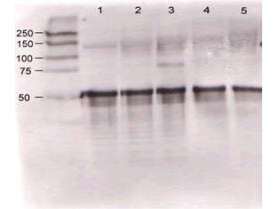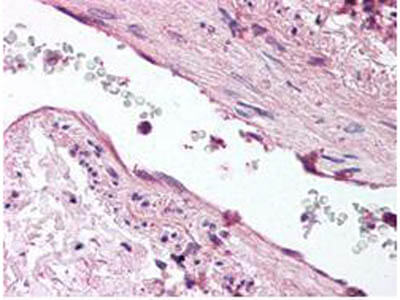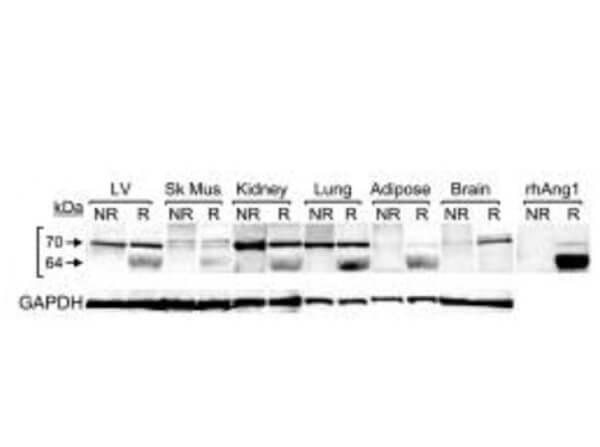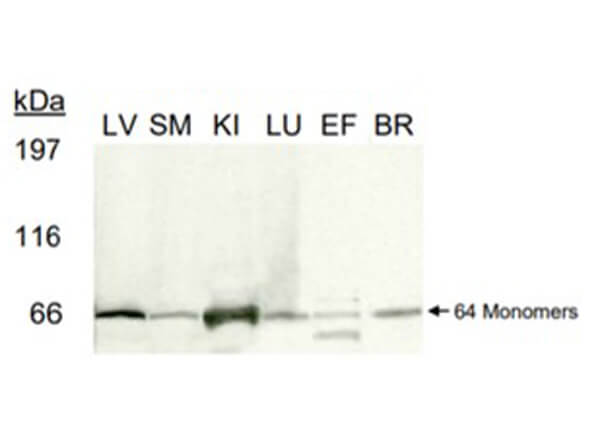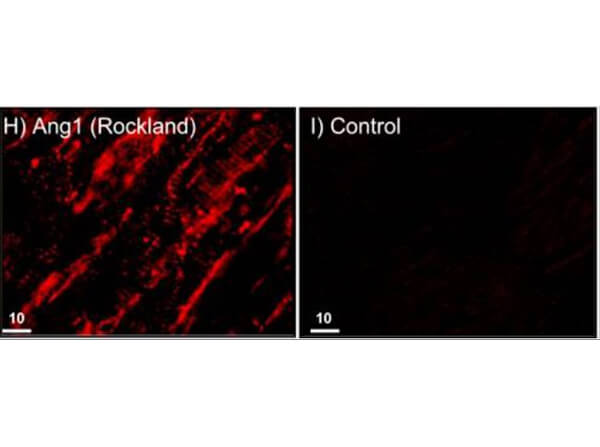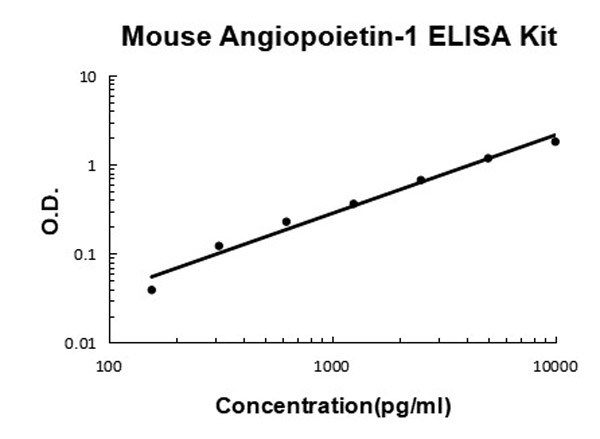Datasheet is currently unavailable. Try again or CONTACT US
Angiopoietin 1 Antibody
Rabbit Polyclonal
2 References
100-401-403S
100-401-403
25 µL
200 µL
Liquid (sterile filtered)
Liquid (sterile filtered)
WB, ELISA, IHC, IF
Human, Mouse
Rabbit
Shipping info:
$50.00 to US & $70.00 to Canada for most products. Final costs are calculated at checkout.
Product Details
Anti-Angiopoietin 1 (RABBIT) Antibody - 100-401-403
rabbit anti-Angiopoietin 1 Antibody, rabbit anti-ANG1 antibody, AGP 1 antibody, AGP1 antibody, AGPT antibody, ANG 1 antibody, Angiopoietin1 antibody, ANGPT 1 antibody, ANGPT1 antibody, KIAA0003 antibody
Rabbit
Polyclonal
Antiserum
Target Details
Angpt1 - View All Angpt1 Products
Human, Mouse
Conjugated Peptide
This whole rabbit serum was prepared by repeated immunizations with a synthetic peptide corresponding to a N-terminus region near aa 15-45 of mouse angiopoietin 1 protein conjugated to KLH using maleimide. A residue of cysteine was added to the amino terminal end to facilitate coupling.
Anti-Angiopoietin 1 is directed against mouse angiopoietin-1 and shows no reactivity with mouse angiopoietin-2. This reagent cross-reacts with human angiopoietin 1. Partially cross reactivity is noted with human angiopoietin 2. This product was prepared from monospecific antiserum by a delipidation and defibrination.
Application Details
ELISA, IF, IHC, WB
Anti-Antiopoietin-1 Antiserum has been tested in ELISA, western blot, immunohistochemistry, and immunofluorescence and is suitable for other antibody based assays. A 1:500 dilution is recommended for western blotting. The reaction of this antiserum directly with cell supernatants may result in high background due to reactivity of components in the serum. This can be alleviated by first immunoprecipitating the antibody:antigen complex and then detecting the antigen. This method results in a very clean and strong signal. Both Ang-1 and Ang-2 proteins have predicted molecular weights of approximately 57 kDa and appear on western blots close to their predicted molecular weights. In some instances additional bands may be seen at approximately 75 kDa which represent highly glycosylated forms of the protein that migrate at a higher apparent molecular weight.
Formulation
90 mg/mL by Refractometry
0.02 M Potassium Phosphate, 0.15 M Sodium Chloride, pH 7.2
0.01% (w/v) Sodium Azide
None
Shipping & Handling
Dry Ice
Store vial at -20° C prior to opening. Aliquot contents and freeze at -20° C or below for extended storage. Avoid cycles of freezing and thawing. Centrifuge product if not completely clear after standing at room temperature. This product is stable for several weeks at 4° C as an undiluted liquid. Dilute only prior to immediate use.
Expiration date is one (1) year from date of receipt.
Anti-Antiopoietin-1 Antibody, which recognizes Angiopoietin-1 (Ang-1), has importance in the development of the endothelium by regulating tyrosine phosphorylation of the membrane receptor Tie-2/Tek. Ang-1 binding to Tie-2/Tek causes phosphorylation of the receptor. Ang-2 competes for this binding, and thus blocks receptor phosphorylation. Ang-1 has a potential fibrinogen-like domain at the carboxyl terminus and coiled-coil regions in the amino terminus. Ang-1 is prominently expressed in the myocardium of atrium and ventricle, mesenchymal and smooth muscle cells surrounding most blood vessels, and lung. In the adult, Ang-1 is also expressed in the heart and liver. Anti-Antiopoietin-1 Antiserum antibody is suitable for cardiovascular research.
Egginton et al. (2016). Shear stress-induced angiogenesis in mouse muscle is independent of the vasodilator mechanism and quickly reversible. Acta Physiologica
Applications
WB, IB, PCA
Dallabrida SM et al. (2008). Integrin binding angiopoietin-1 monomers reduce cardiac hypertrophy. FASEB J.
Applications
WB, IB, PCA; IF, Confocal Microscopy
This product is for research use only and is not intended for therapeutic or diagnostic applications. Please contact a technical service representative for more information. All products of animal origin manufactured by Rockland Immunochemicals are derived from starting materials of North American origin. Collection was performed in United States Department of Agriculture (USDA) inspected facilities and all materials have been inspected and certified to be free of disease and suitable for exportation. All properties listed are typical characteristics and are not specifications. All suggestions and data are offered in good faith but without guarantee as conditions and methods of use of our products are beyond our control. All claims must be made within 30 days following the date of delivery. The prospective user must determine the suitability of our materials before adopting them on a commercial scale. Suggested uses of our products are not recommendations to use our products in violation of any patent or as a license under any patent of Rockland Immunochemicals, Inc. If you require a commercial license to use this material and do not have one, then return this material, unopened to: Rockland Inc., P.O. BOX 5199, Limerick, Pennsylvania, USA.

